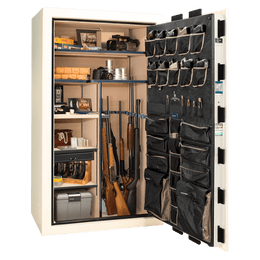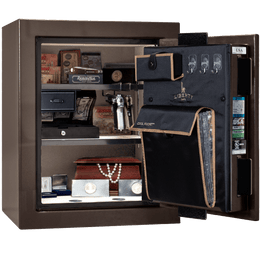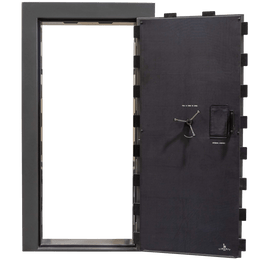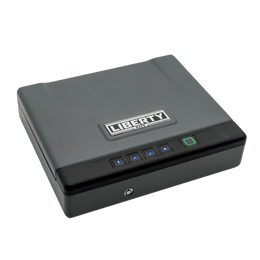Let’s be clear: Firearms are potentially dangerous. Like using an automobile, chainsaw, kitchen knife, or electrical fuse panel, improper or untrained firearm use can be deadly. That’s why we recommend that you educate yourself on the safe operation of your particular firearm, get proper firearms training, practice regularly to maintain your skills, follow the “four rules” of firearm safety, and buy the best quality guns and ammunition. We recommend that all firearms be securely locked in a quality US-made gun safe or handgun vault when not under the direct control of the owner.
One question often asked is whether it’s a legal requirement to keep your guns in a gun safe. Gun laws in America vary from state to state and even from city to city in many cases, so it can be difficult to know what’s a law and what’s a recommendation. Let’s see if we can shed some light on this subject.
PLEASE NOTE: We have reasonably attempted to provide accurate information at the time of this writing, but we are not lawyers or lawmakers, and firearms laws can change frequently. It is your responsibility to always check and conform to your local laws. Neither Liberty Safe nor the author assumes any liability for the use or misuse of this information.
Benefits of owning a gun safe
Before discussing whether you’re legally required to own a gun safe, it’s a good time to point out the many benefits of owning a quality safe. Here are just a few.
Helps prevent theft or unauthorized access to your firearms and valuables
In some jurisdictions, you could be held partially or fully liable for crimes committed by someone who gained easy access to your firearms and ammunition. A good gun safe not only helps deter burglars and thieves but might demonstrate your commitment to keeping your firearms out of the hands of “bad guys.”
Additionally, keeping your guns securely locked up helps prevent family members, children, or friends from gaining access to your guns and potentially harming themselves or others.
Finally, heirloom firearms or other valuables can have significant monetary, historical, and/or personal value, and their loss, theft, or damage can be financially and emotionally painful. Keeping these treasures properly locked up can help prevent this trauma.
Can protect against fire, smoke, and water damage in a house fire
Nobody likes to think about the devastation of a house fire, but the reality is they happen, and sometimes through no fault of your own. Electrical defects, pest damage, wildfires, acts of God (a legal term), or faulty consumer goods are just a few causes of total-loss home fires in the US annually. A quality smoke alarm system, proper fire-prevention practices, and a good, fire-rated safe are all ways to prevent the emotional and physical effects of a house fire.
Liberty Safe has multiple testimonials from safe owners whose homes were burned but who were able to recover valuable documents, cash, firearms, family history records, and more from their Liberty Safes after a house fire.
Liberty Safe Survives a Raging Garage House Fire: How to Impress a Fire Chief
A properly humidity-controlled safe prevents mold, corrosion, and damage to contents.
This is not a commonly known benefit to safe ownership, but it should be. Most of the US population lives in areas with greater than 50% relative humidity most of the time. Archivists, museums, and the NRA all recommend that for ideal long-term preservation of paper, photographs, documents, valuables, electronics, and firearms, items should be stored in a low-humidity environment between about 30% to not more than 50%, and at stable, cool temperatures. If your home is not humidity-controlled, your gun safe (if equipped with a dehumidifier, as it should be) may be the only suitable location in your home for storing things like family history records, photo albums, electronics, hard drive backups, and even prescription medications, let alone firearms.
Is it a legal requirement to own a gun safe if I own guns?
The short answer to this question is, probably not, but it might be, depending on where you live. However, note that a gun safe is typically not the only option for qualifying secure gun storage according to these local laws and ordinances, though a quality fire- and tamper-resistant gun safe or handgun vault is arguably the best option in most cases. Unfortunately, an easy answer is not possible since cities and states all use different languages and enact different requirements for safe firearm storage, if they require it at all. Additionally, each regulating body may have a different definition of a qualifying secure gun storage or firearm safety device.
Does US federal law require the use of a gun safe for firearms owners?
There are no federal safe storage laws, but federal law requires that firearm importers, manufacturers, and dealers provide “secure gun storage or safety device; with any handguns they sell. This usually means a cheap trigger lock or cable lock.
Federal law does not require that the purchaser use the secure gun storage or safety device but does immunize the lawful owner of a handgun who uses a secure gun storage or safety device from certain civil actions based on the criminal or unlawful misuse of the handgun by a third party if 1) the handgun was accessed by another person who did not have the authorization of the lawful possessor, and 2) at the time the handgun was accessed it had been made inoperable by the use of a secure gun storage or safety device — see 18 U.S.C. § 922(z)(3). This is just one of many good reasons you should keep your firearms securely locked up when not in use.
However, this federal law is often superseded by state or city regulations, which we’ll explore below.
Gun storage laws by state
In most states, you are not legally required to securely store your firearms using any particular device or method, though, of course, it’s a good idea to keep any firearms that are not under your direct control securely locked up for multiple reasons. However, some states and cities have enacted laws requiring the “safe storage” of firearms, with criminal and/or civil penalties and fines if you don’t do it. Note that the term “safe storage” here doesn’t necessarily mean storage within a gun safe, but rather this meaning of “safe” should align with “secure.”
There are also differences between what are called “Child Access Prevention” laws (CAP) and “Safe Storage” laws. CAP laws are generally applicable after a minor/child or other unauthorized person gains access to firearms, though, in some very restrictive locations, CAP laws prevent leaving firearms so that a child can access them. Safe storage laws, on the other hand, specifically define what it means to safely store a firearm in that jurisdiction and require gun owners to keep unattended firearms stored in those specified ways. States/jurisdictions can either require that all unattended firearms be stored safely at all times, or they may only require it when certain people are likely to be present, such as minors or people who are prohibited from firearms possession, such as felons.
25 states with Child Access Prevention or “safe storage laws”
US states (and districts) with Child Access Prevention or “safe storage laws” include California, Colorado, Connecticut, Delaware, the District of Columbia, Florida, Hawaii, Illinois, Iowa, Maine, Maryland, Massachusetts, Michigan, Minnesota, Nevada, New Hampshire, New Jersey, New Mexico, New York, North Carolina, Oregon, Rhode Island, Texas, Virginia, Washington, and Wisconsin.
In each of these states, from what we can tell, a quality handgun vault or gun safe conforms with the requirement for the reasonable prevention of firearms access by minors (CAP laws) and any applicable “safe storage” laws. However, a gun safe or handgun vault is not specifically required, as other secure, lockable firearm storage options qualify, depending on the state. Please check your local laws and ordinances.
5 US states require all firearms to be “safely stored” to prevent access by unauthorized users
The following five states require gun owners to keep unattended guns stored in specified ways to prevent access by all unauthorized individuals or a subset of people, such as minors and people legally prohibited from possessing firearms: Massachusetts, Oregon, Colorado, Connecticut, and New York.
In all cases, a quality gun safe qualifies as one of the options for “safe storage” of a firearm, but a gun safe is not specifically required. Other secure locking receptacles meeting the states’ definitions of secure firearm storage are acceptable, so check your state laws for their definitions.
Some of these states require all gun owners to safely store their firearms as defined by the state but only impose penalties if a minor is likely to, or does, access the firearm. Again, be sure to check your local and state laws for details.
In addition to criminal codes, additionally, four states impose strict civil liability and specifically allow lawsuits against people who fail to store firearms properly or allow firearms access to minors: California, Connecticut, Massachusetts, and Oregon.
US Cities with stringent safe firearm storage ordinances
Some cities and counties now enact their own firearms laws, either in addition to or sometimes in conflict with their state laws. Some cities with additional safe storage requirements include:
- San Francisco: Under the San Francisco ordinance, handgun owners can keep their weapons at home but must keep them locked in safes or disabled by trigger locks when not using them.
- New York City: NYC prohibits any resident from letting any firearm out of his or her immediate possession or control without having first securely locked such firearm, rifle or shotgun in an appropriate safe storage depository or rendered it incapable of being fired by use of a gun locking device appropriate to that weapon.
- Chicago and Cook County, IL: Chicago’s secure firearm storage laws are more strict than state law: In Illinois, you must secure the firearm if you have children present in your home: Less than 18 years, if in Chicago (Ordinance 8-20-050); Less than 21 years, if in Cook County (Chapter 58, Article VIII, Sec. 58-205); Less than 14 years in other areas of Illinois (720 ILCS 5/24-9 Sec. 24-9).
- Davis, California: Davis (along with several other California cities such as Oakland, Berkeley, Alameda, Antioch, Dublin, Pleasanton, and Walnut Creek) has enacted local safe firearms storage requirements that are stricter than CA law, including descriptions of legal firearm storage in vehicles.
- Boston: In addition to the state-mandated trigger lock for all firearms, the city recommends that you “Install a high-quality safe. Make sure it’s securely bolted to the floor.” For vehicles, “Install a gun lockbox. Bolt the box to the car frame, or, at the very least, cable lock it to the car frame in the trunk.”
- Minneapolis/St. Paul: The Twin Cities are proposing a new safe storage ordinance.
This is not an exhaustive list, so check your local laws and city ordinances.
Washington State and Seattle’s safe firearm storage laws
As an example of how problematic and confusing these local “safe storage” ordinances can be, let’s look at Seattle’s law. Seattle’s “Responsible Storage Law” requires gun owners to keep their guns in a locked container when not being carried by them or under their control and impose fines for crimes committed with an improperly stored gun. The law went into effect on February 13, 2019. The city of Edmonds, WA, passed a similar law, but it was struck down for violating Washington state’s law prohibiting cities from enacting more restrictive gun laws than are passed by the state. As far as we can tell, Seattle’s ordinance is still in place.
Seattle’s office of the Mayor says, “IMPORTANT TO NOTE: Only ‘Lock Boxes,’ ‘Gun Safes’ or ‘Gun Vaults’ will meet the City of Seattle requirements that guns are secured in a locked container.”
So, what does a “locked container” mean as far as the city of Seattle is concerned? As you can see in this administrative rule concerning the safe storage of firearms:
Items (c) and (d) are problematic grammatically and legally since it’s unclear whether the device must include three variables if it also or only utilizes a key. The terms “easily” and “common tools” are extremely subjective. Furthermore, even if your “safe, gun safe, gun cabinet, or lock box” is defeated by a burglar, this law may necessarily blame you for a firearm’s misuse since requirement (d) was, by definition, not followed. This means that even if you followed the ordinance to the best of your ability, your choice of the container was defeated by a thief; it may be your fault. You can be assessed with the penalties: “Up to $500 fine (or community service) for failure to store a gun in a locked container. Up to $1,000 fine (or community service) if a youth obtains the unsafely-stored gun, prohibited individual, or “at-risk person.” Up to $10,000 if the unsafely-stored gun is used to injure, kill or commit a crime.”
Seattle tries to look kinder to those who might not be able to afford a suitable “locking container” by pointing out that Washington law holds all gun safes and lock boxes tax-exempt.
Store your guns with Liberty Safe
Whether or not you live in a location that requires you to use a secure, lockable gun storage container like a handgun vault or gun safe, we recommend you do so. Not only does keeping your firearms securely locked help prevent unauthorized access by children or thieves (along with the potential criminal and legal action resulting from negligent firearm storage), but it provides peace of mind in knowing that your firearms and heirlooms are more secure from loss and damage.







